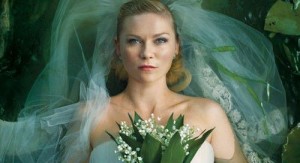film review: melancholia
 Lars Von Trier’s new film Melancholia attracted some controversy at the 2011 Cannes Film Festival earlier in the year when the director claimed that he sympathised with Hitler. As a result, he was named ‘persona non grata’ and was dismissed from the Festival, but the leading lady Kirsten Dunst rightfully won the Best Actress Award. Melancholia, which has been working the festival circuit ever since, is a dark apocalyptic film, bounded by a strange beauty.
Lars Von Trier’s new film Melancholia attracted some controversy at the 2011 Cannes Film Festival earlier in the year when the director claimed that he sympathised with Hitler. As a result, he was named ‘persona non grata’ and was dismissed from the Festival, but the leading lady Kirsten Dunst rightfully won the Best Actress Award. Melancholia, which has been working the festival circuit ever since, is a dark apocalyptic film, bounded by a strange beauty.
In line with Von Trier’s auteur style, the story takes on a two-part structure and the cinematography shifts between intimate hand held camera work and sweeping long shots of the Victorian mansion and countryside in which the film is set – techniques which are both compelling, but distracting at the same time.
In a similar vein to Terrance Malick’s The Tree of Life, Melancholia’s opening sequence is long and obscure – images of birds falling from the sky, horses sleeping, and planets moving across the solar system, flow across the screen as a hauntingly perfect operatic score sets the tone of the film. We are then introduced to Justine (Kirsten Dunst) a successful advertising copywriter on her wedding day. The celebrations have been organized by her sister Claire (Charlotte Gainsberg) and her wealthy husband (Keifer Sutherland). It is clear from the outset that Justine has problems – she finds various ways to delay the festivities (by having a bath) and she doesn’t seem to have a real connection with her husband (Alexander Skarsgaard).
Part Two of the film juxtaposes Claire’s more together life with the now severely depressed Justine who is fully reliant on her sister. These two stories are compounded by the fact that a planet Melancholia, has been predicted to collide with Earth in the coming days. The film manages to successfully reach its climactic ending and while this is a beautifully crafted film, it probably won’t be appreciated by everyone.


This film was absolutely stunning. True, it probably won’t be appreciated by everyone, but I think the key is to be warned about what you’re in for. Yes, there is a long, seemingly random, opening montage, but it makes more sense by the end of the film. I would advise not to try too hard to figure it out, but just sit back and enjoy the beautiful visual imagery. The film itself is quite long as well, but there’s so much there to think about that it does not feel gratuitously long.
Possibly my favourite film of the year!
Pingback: Another Earth | Film Review | Lip Magazine